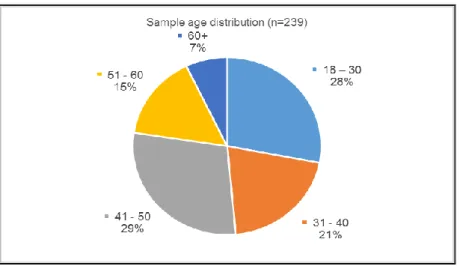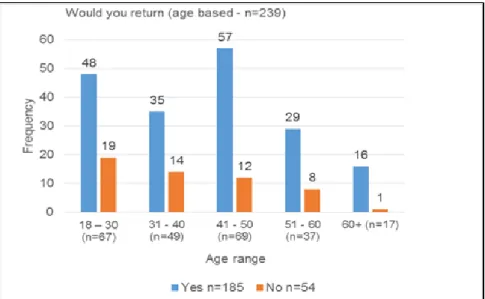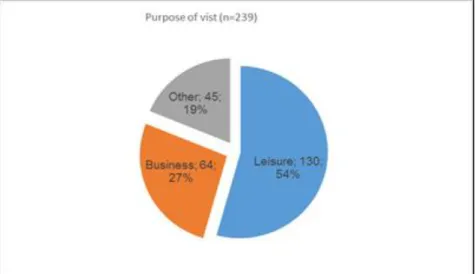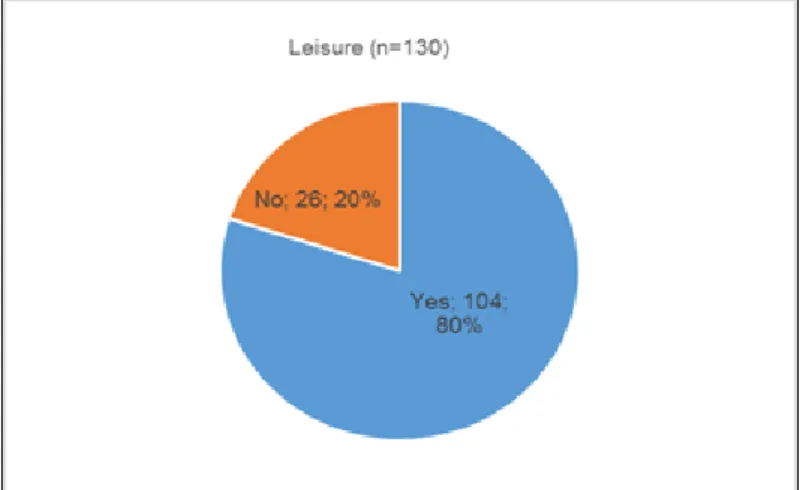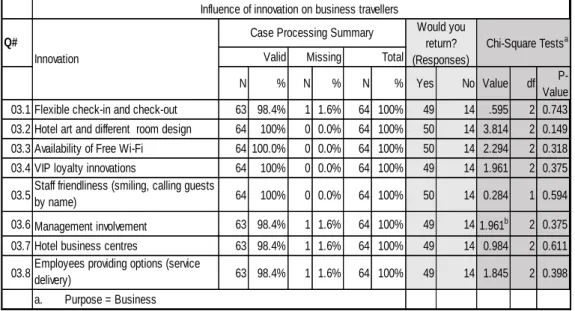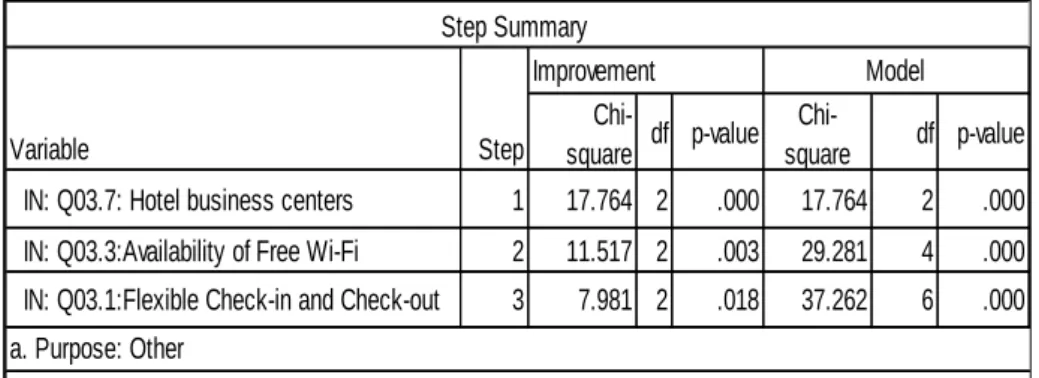With the increased competition in the hospitality industry, researching hotel product innovation becomes necessary for both practical and theoretical relevance. Tourists: "Temporary visitors staying at least 24 hours in the visited region for leisure, business (meetings and conferences) or other purposes"; Reisinger and Turner (2003:37).
Introduction
Background to the study
Statement of research problem
Despite the lack of clarity, it is believed that hotel product innovation can be used as a strategy to attract customers, increase patronage and influence customer loyalty.
Background to the research problem
Perera focused on innovation and its contribution to a hotel product and its online presence, while Sandvik, Duhan and Sandvik investigated the relationship between the innovativeness of hotels and their profitability. However, no research in hospitality innovation has examined the influence of hotel product innovation on customer loyalty.
Research questions
The research purpose statement
The objectives of the research
To identify and understand the influence of hotel product innovation on customer loyalty in the Cape Metropole region. To draw conclusions from the relationships established in objective 3 above and make recommendations on innovative product preferences that affect customer loyalty in the hospitality industry.
Research methodology and design
- Primary data sources
- The research instrument and data collection techniques
- Research population
- The research sample and sampling procedure
- Research data analysis and presentation
Respondents were selected from guests visiting Cape Town for leisure, business or other reasons. A self-administered questionnaire was used to collect primary data from a purposive sample of guests staying at the rated hotels in Cape Town.
Reliability and validity
Reliability
The Chi-Square analysis looked for evidence of the statistical significance of the influence and importance of individual innovations (independent variables) on guests. Logistic regression analysis was also applied to determine the statistical significance of the influence of combined innovations (independent variables) on customer loyalty (dependent variable).
Validity
Thus, the reliability of the findings was assessed by comparing data collected from three different locations using the same data collection instrument (Mitchell. Therefore, future similar studies could be repeated and similar data could be obtained using the same methodology.
Ethical considerations for the study
The respondents were drawn from guests from all over the world on leisure, business or visiting Cape Town for other purposes. Respondents were not forced to answer the questionnaire and could choose not to answer questions that were considered uncomfortable.
Delineation of the study
Respondents were assured of the confidentiality of their answers and the use of the research findings for academic purposes only. In particular, the questionnaires were designed to avoid personal questions, prevent the disclosure of the respondent's identity, and did not reveal the names of the hotels.
Limitations of the study
The purpose of this part of the study is to understand the impact of marketing innovation on customer loyalty in the hotel industry. Furthermore, the logistic regression results (Appendix J) find that when combining product innovation, the availability of free wireless Internet access has a strongly positive significant effect on customer loyalty for leisure guests—the logistic p-value is 0.001.

Significance of the research
Expected outcomes, results and contributions of the study
Customer perspectives and perceptions of hotel product innovations have been analyzed and the respective impact on guest retention intentions has been determined. Quantitative measures can be established to examine the influence of hotel product innovations and the literature can serve as a guide and benchmark for strategic entrepreneurs in the hospitality industry.
Format of the research document
Summary
Introduction
Innovation defined
This comes from changes in structures and human resources, or by bringing new offers and differentiated hotel experiences to guests. Therefore, questions can be raised as to whether such an investment to implement innovations will make it possible to transform transient guests into loyal customers.
Hotel product defined
In an effort to identify hotels that can effectively implement an innovation strategy, Hjalager (2002) argued that innovations are central to higher-rated hotels that have the resources necessary to implement and commercialize innovation processes.
Product innovation approaches
The historical development of innovation
The influence of innovation on customer loyalty is therefore still an unresolved issue in the tourism industry. Therefore, this study seeks to investigate the innovative factors that influence customer loyalty in the hotel industry.
Hotel innovation and tourist arrival in Cape Town
Furthermore, positive growth was again reported for all of Cape Town's major attractions in February 2014 (Cape Town Tourism, 2014. Industry Performance Report: October 2013 - March 2014). Therefore, the importance to hotels in Cape Town of building strong and loyal customer bases cannot be overstated.
Theoretical concepts of customer loyalty
Loyalty programs in hospitality
Studies have shown that loyalty programs are designed to focus exclusively on a specific VIP guest or group of business travelers and are assumed to provide a sense of social status and receive special attention during the duration of the hotel stay (Drèze & Nunes, 2009:890). Different studies have shown that loyalty programs are designed for different guests depending on the commitment in terms of consumption pattern towards a specific hotel (Brogan, 2010:46).
Rationale to the problem
The rationale for the study resulted from the hotel industry's inability to identify and clarify the impact and importance of product innovation on patronage and customer loyalty. Given the predictions of exponential growth in tourist arrivals, particularly in the Cape Town metropolitan region, the impact of hotel product innovation on customer loyalty needs to be clarified.
Product innovation strategy
Product innovation strategy in a competitive hotel industry
Coinciding with predictions of exponential growth in tourist arrivals in Cape Town, there has been a phenomenal growth of highly innovative luxury boutique hotels around Cape Town and in the global hotel industry at large. While this is particularly the case in the US and UK, South Africa is no exception.
Product innovation strategy to attract guests
Integration strategy for tangible and intangible hotel product
The generic characteristics of tourism products
- The intangibility of hotel products
- The inseparability of hotel products
- Heterogeneity of hotel products
- Perishability of hotel products
Like any other labor-intensive service-oriented industry, service delivery is the source of competitive advantage in the hospitality industry. Thus, innovations in service delivery can be designed to exceed personalized guest expectations as opposed to standardizing tangible hotel product offerings.
Dimensions of hotel product innovations
- The influence of hotel design innovations on customer loyalty
- The influence of technological innovations on customer loyalty
- The influence of hotel marketing innovations on customer loyalty
- Flexible check-in and check-out times
- VIP loyalty innovations
- Influence of human resources innovations
- Staff providing options during service delivery
- Staff friendliness (smiles and addressing guests by name)
- Management involvement during service delivery
However, it is unclear to what extent customer loyalty depends on the quality of work, knowledge of the offer and professionalism. Therefore, this study seeks to understand the impact on customer loyalty of skilled personnel with the ability to provide product options.
A conceptual model
For decades, management involvement has been seen as an important part of service provision in hotels (Siguaw & Enz, 1999). In another study, Jen-Son et al. argued that management involvement integrates the physical and the intangible products, employees and processes of hotel service delivery.
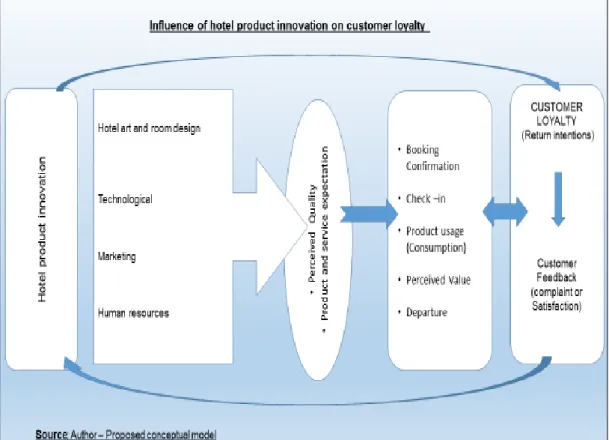
Summary
Introduction
It is hoped that the study findings will be of direct benefit and effect in day-to-day planning around hotel product strategy and design, and will influence factors in important decisions about innovations leading to greater customer loyalty in the hotel industry. Therefore, below follows a discussion of the research methodology and research strategy that was implemented to achieve the above objectives.
Theoretical aspects of the research methodology
However, for the findings to be useful they must be valid and as Kumar (2005:4) noted, the validity of research findings depends on the soundness of the research methodology used. The sections below provide an understanding of the various research methodologies and clarification of the specific research steps or strategy (methodology) adopted when conducting the research to answer the research questions.
Various approaches to research methodology
Quantitative approach
On the basis of the above, a research methodology was adopted, which provided a systematic path to answers to the research questions (Kumar, 2005:16).
Qualitative approach
The aim of the study was to identify generalizable findings in the hotel industry, which is the reason for the quantitative approach.
Triangulation
Approach followed for this research
Research design
Research types
Exploratory research
Explanatory research and the rationale
Rationale for quantitative research approach
Overview and rationale of the study areas
From the pilot survey, 25 respondents accepted to complete the questionnaire and their answers were a guide in structuring the final questionnaire. Therefore, most of the guests who visited the attraction (Kirstenbosch National Botanical Garden) stayed in hotels that resemble the characteristics of innovative hotels (Hjalager 2010).
Population, sample structure and sampling technique
- The population
- The sample structure
- The sampling technique
- Rationale for systematic random sampling
The researcher therefore changed the data collection technique to random systematic sampling through direct or personal administration of the same questionnaire to guests staying at hotels in the Cape Town Metropolis. Of the total (242) respondents, the majority (131) were leisure travellers, 64 on business and 46 other travellers.
Methods of data collection
Research instrument
Primary data collection
Procedure of data collection
Pilot survey (reasons for piloting)
The questionnaire was also tested to ensure validation of the survey, for specificity and ease of understanding. The researcher requested just five to eight minutes of the guest's time and thus created a good rapport for the participants to complete the questionnaire.
Questionnaire design
The rationale and questionnaire layout
This looks at the profile of the respondent to determine whether there are differences in customer loyalty based on demographics. This analysis provided insight into the purpose, to determine whether return intentions are influenced by the purpose of the visit.
Methods for data analysis
Quantitative data analysis
- Frequencies and Cross- Tabulations
- The Chi-Square Tests (x²)
- Logistic regression analysis
Discussion of the innovation that was particularly important to guests in their recent hotel choice was collected for analysis (Q06). After considering the assumptions, the Chi-square tests as first developed by Fisher (1922) and Pearson (1916) were found suitable for the study to test statistical significance of the survey data expressed in and measured at the nominal level.
Data analysis for responses to open-ended questions
Field work challenges
Summary
Introduction
Interpretation of Chi-Square tests and Logistic regression statistics
The general approach is that all p-values below 0.05 (Chi-Square p-value <0.05) are considered significant for customer loyalty (Sobuwa et al., 2014). Conversely, Chi-Square p-values above the 0.05 limit (Chi-Square p-value>0.05) are considered statistically insignificant relationships between the individual dimensions of innovation (independent) and customer loyalty (dependent).
Section One: Analysis of sample demographic characteristics
Analysis of sample gender profile
As can be seen, 85 of 112 male and 100 of 127 female respondents reported returning to the same hotel. However, results of inferential statistical analysis do not support the findings of descriptive statistics; it finds that gender has an insignificant impact on customer loyalty, confirmed by a Chi-Square test p-value above the significance level of 0.05 (Chi-Square value = 0.276, df = 1, p-value = 0.599).
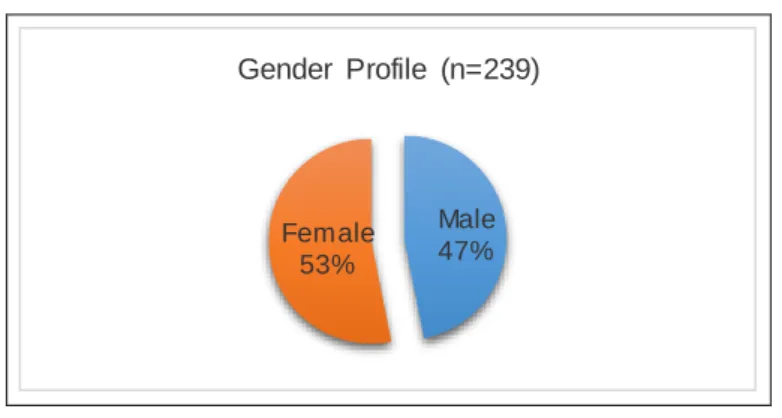
Analysis of sample age profile
Future studies may need to examine the reasons for the higher proportion of men not intending to return to their previous hotel compared to women. However, future studies may need to examine product innovation factors that affect customer loyalty for different ages.
Analysis of sample educational level
Bachelor's and Master's degree holders appear to have relatively higher percentages of respondents with no intention to return (26% and 27% respectively). Table 4.2: Analysis of return intentions by educational level. However, the results of the statistical analysis confirm that the level of education has an insignificant impact on guests' return intentions as confirmed by the Chi-Square Test p-value above the significant level of 0.05 for education (Chi-Square value = 3.778, df = 4, p-value = 0.437).
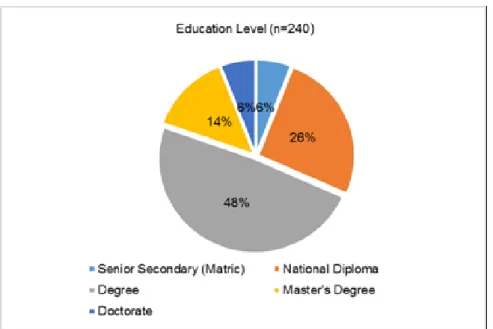
Section Two: Analysis of primary purpose of visiting Cape Town
Analysis of loyalty influences for leisure travellers
This section analyzes the effect of innovative influencing factors on customer loyalty for leisure guests. With the exception of the three innovations mentioned above, all other innovations in the study showed no statistically significant impact on customer loyalty for leisure guests.
Analysis of loyalty influence for business travellers
Contrary to the descriptive statistics findings presented above, chi-square tests found that product innovation has no significant effect (chi-square p > 0.05) on customer loyalty among business travelers. As presented in Contingency Table 4.5 below, the results of chi-square tests show that there is no statistical evidence to support the pattern established from descriptive statistics.
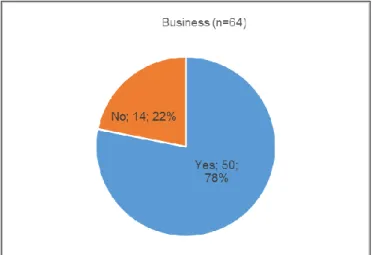
Analysis of loyalty influence for other travellers
Further analysis with the logistic regression model proved that none of the hotel product innovations has any impact (negative or positive) on business travelers. Furthermore, hotel business centers have strong statistical evidence (Chi-Square value = 13.412, df = 2, p-value = 0.001) that they influence return intentions for other travelers.
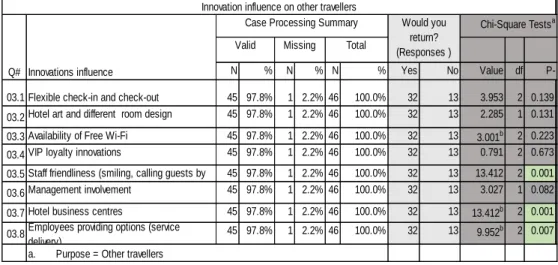
Section Three: Hotel attributes
Innovations are more common in the higher-rated hotels that (they argued) have the resources to finance new product innovations. Therefore, the results show that higher-rated hotels are associated with guest retention (more loyal guests).
Section Four: Innovation influence on guest return intentions
About 10% (25 respondents) said it has no impact, while 20% (48 respondents) identified free Wi-Fi availability as having a negative impact on their return intentions. Management involvement is considered by the majority of respondents (57%, 136 of 238) to have no impact at all, while 40% (96 respondents) say it has a positive impact on their return intentions.
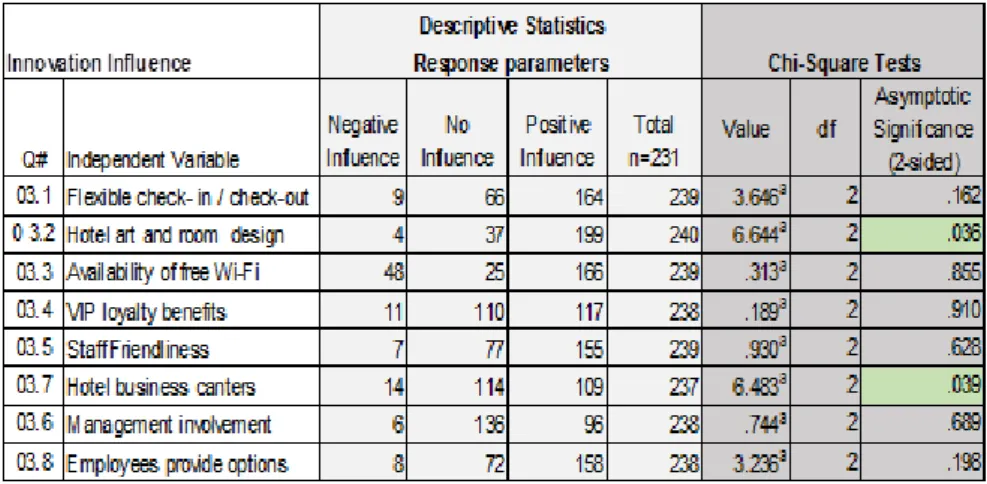
The influence of hotel art and room design on guest return
Only six respondents consider management involvement to have a negative influence on their return intentions and loyalty decisions. Based on these statistics, a conclusion can therefore be drawn that hotel art and room design in themselves have a positive influence on customer loyalty.
The influence of technological innovations
The influence of hotel business centres
The graphical representation in Figure 4.11 above confirms the positive influence between hotel business centers and guests' return intentions. Furthermore, when product innovations are combined, logistic regression analysis shows a statistically significant relationship between hotel business centers and guests' return intentions (logistic p-value = 0.004).
The influence of availability of free Wi-Fi
The influence of marketing innovations
The influence of flexible check-in /check-out
For example, based on the results of descriptive statistics and inferential statistics, it can be concluded that flexible check-in and check-out in combination with other innovations have a positive influence on customer loyalty.
The influence of VIP Loyalty innovations
For example, based on the results of descriptive statistics and inferential statistics, it can be concluded that flexible check-in and check-out in combination with other innovations have a positive influence on customer loyalty. Yilmaz & Bititc, although with relatively no influence on future return intentions and hotel choice decisions.
The influence human resources innovations
Staff providing options
Management involvement
Staff friendliness
Section Five: The importance of innovations
The importance of hotel art and room design
Supporting the Chi-Square results, logistic regression statistics determined that hotel art and different room design are not significant in customer patronage decisions, even when combined with other innovations (logistic p-value = 0.239) . Therefore, it can be concluded that hotel art and different room design can help attract guests, but they are not important when guests decide on return visits to a hotel.
The importance of technological innovations
The importance of availability of free Wi-Fi
This study investigated the influence of hotel product innovation on customer loyalty in the Cape Metropole. By itself, hotel art and unique room design have a big impact on customer loyalty.
The importance of hotel business centers
The importance of marketing innovations
The importance of VIP loyalty innovations
The graph shows that just over half (120 out of 236) of respondents consider VIP loyalty innovations unimportant in hotel patronage and return decisions. When combined with other innovations, the logistic regression analysis also shows an insignificant effect of VIP loyalty innovations on patronage decisions (logistic p-value = 0.610).
The importance of flexible check-in or check-out
The Chi-Square tests show evidence that VIP loyalty innovations by themselves have an insignificant effect on guest return intentions (Chi-Square value = 5.627, df = 2, p-value = 0.060).
The importance of human resources innovations
The importance of staff friendliness
The importance of staff friendliness (calling guests by name, smiling) on guest return intent has been statistically analyzed and the majority (184) of respondents said they would return to the same hotel they previously stayed in, 43 respondents considered it unimportant to be called by name after them. As can be deduced from the figure above, mentioning guests by name during the service was assessed as unimportant (64 guests) or neutral (85 guests) by 149 respondents.
The importance of staff providing options
Therefore, as presented in Appendix H, it can be argued that staff friendliness has a significant impact on customer loyalty and that there is a strong connection between staff friendliness and customer loyalty. Therefore, the findings agreed with Shilpa revealing that employee performance has a significant impact on customer loyalty in the hospitality industry.
The importance of management involvement
Section Six: Analysis of responses for open-ended questions
Innovations with most influence
The frequency distributions of the analysis on the influencing factors in hotel choice are presented in the pie chart Figure 4.25 below. In support of the findings above, studies by Siguaw and Enz (1999) found that technological innovations have more influence on customer satisfaction and increase return intention.
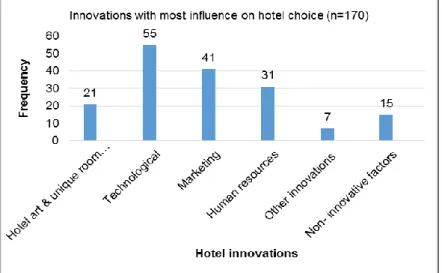
Innovations that was important to recent hotel choice
Thus, responses to open-ended questions highlighted the greater extent to which technological innovations influenced their hotel selection decisions. In a different study, Singh and Kasavana (2005:28) stated that technological innovations have become an integral influencing factor in hotel guest stay.
Why should guests return to the same hotel?
As shown in Figure 4.29 below, 53 of the total number of respondents (n=174) alluded to service being essential to their hotel choice and return intentions. The second largest percentage (18%) indicated that they do not intend to return to a previous hotel, regardless of the innovations offered.
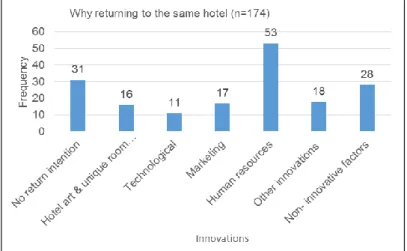
General discussion of the results
Hotel star rating showed a significant relationship with customer loyalty, with higher rated hotels showing higher percentages of respondents who would return to the same hotel. Such findings support Hjalager's (2010) view that innovations are usually associated with higher rated hotels.
INTRODUCTION
CONCLUSIONS
- Influence of hotel product innovation
- Influence of hotel product innovation on travellers for a specific purpose
- Importance of hotel product innovation on customer loyalty
- Relationship between hotel product innovation and customer loyalty
- Innovation combinations recommended
When innovations are combined, availability of free Wi-Fi, flexible check-in/check-out, and business centers have a significant positive relationship with customer loyalty. Other travelers: Staff friendliness (call guests by name, serve with a smile), hotel business centers, availability of free Wi-Fi access around the hotel, employees providing options, management involvement during service delivery, and flexible check-in/check-out times .
Conclusions with regard to research objective 1
Innovative influences on guests visiting Cape Town for leisure
Results from descriptive statistics revealed that the majority of leisure guests would return to an innovative hotel, product innovations such as staff friendliness, management involvement and free Wi-Fi access have been found to have a statistically insignificant impact on return intentions of leisure guests. However, consistent with Starkov (2001), when innovations are combined, the availability of free Wi-Fi access around the hotel has a significant impact on customer loyalty for leisure guests.
Innovative influences on guests visiting Cape Town for business
Innovative influences on guests visiting Cape Town for other purposes
Conclusions with regard to research objective 2
Conclusions with regard to research objective 3
The relationship between innovation and loyalty for leisure travellers
However, in combination with other innovations, the availability of free Wi-Fi access had a positive impact and there was a stronger significant relationship with customer loyalty. The relationship between innovation and loyalty for business travelers The survey results showed no significant relationship between hotel product.
The relationship between innovation and loyalty for business travellers
However, no significant relationship could be established in combination with any of the VIP loyalty innovations, staff addressing guests by name (kindness and smiles), direct management involvement during service delivery, business centers with the latest computer technology, or employees offering opportunities during the provision of services. The relationship between innovation and loyalty for other travelers The study concludes that when implemented individually, employees deliver.
The relationship between innovation and loyalty for other travellers
Conclusions with regard to research objective 4
Qualitative data analysis supports the significant impact of friendliness and staff addressing guests by name, and has shown a significant relationship between human resources innovations and customer loyalty. On the other hand, customer loyalty for business travelers has not shown a significant relationship with hotel product innovation.
RECOMMENDATIONS
Therefore, product design should consider combining an innovative product mix to achieve a significant influence on customer loyalty. For example, as presented in the conclusions above, the combination of hotel art and room design with business centers showed a greater significant influence on customer loyalty.
FURTHER RESEARCH POSSIBILITIES
GENERAL CONCLUSIONS
Derived from the study's findings, VIP guests are most influenced by HR innovations, demanding personal attention and a variety of options. Finally, the responses from the open-ended questions proved that HR innovations are more important for guests' return and hotel selection decisions.
Institute for Strategy and Competitiveness Human resource development in the Mauritian hotel industry: myth or reality. The effect of experiential value on customer satisfaction with service encounters in luxury hotel restaurants”, International Journal of Hospitality.
Variables NOT in the logistic equation- Innovation influence on business
